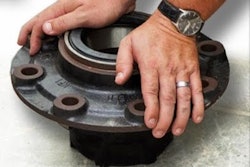
Last week Thursday, Michigan Rep. Andy Levin introduced what's being called the Guaranteeing Overtime for Truckers Act in the House of Representatives. Bill number HR 7517 would remove the exemption codified in the Fair Labor Standards Act nearly a century ago and applied to many over-the-road employee drivers thereafter, offering no guarantee of time-and-a-half pay after 40 weekly hours worked for employing motor carriers.
The move comes on the heels of a growing focus on the FLSA exemption.
Removal of the exemption was included as a suggested priority action for the Department of Transportation in its Supply Chain Assessment of the Transportation Industrial Base, itself based largely on stakeholder input taken amid disruptions that exposed vulnerabilities in the aftermath of the COVID-19 pandemic. Specifically, the document noted as an action item a policy recommendation for the DOT to "urge Congress to eliminate the Fair Labor Standards Act motor carrier exemption. Under the current exemption, employers are not required to pay overtime to many truck drivers."
At least one lawmaker from each major political party is represented among cosponsors of the HR 7517 legislation, from principal sponsor Levin of the Democratic Party to several fellow cosponsors from his party and a lone Republican, Jefferson Van Drew of New Jersey.

[Related: Is it overtime for company-truck-driver overtime pay?]
The Owner-Operator Independent Drivers Association, which has long argued in favor of removal of the overtime-pay exemption for employee drivers, signaled favor for the legislation with a press release in which OOIDA President Todd Spencer argued the move would be a boon to the basic value of drivers' time, which "for too long, too many people throughout the supply chain" have undervalued, he said. “Shippers, receivers and carriers have never been forced to account for all the hours that they keep drivers waiting, since it costs them nothing to do so. By repealing the FLSA exemption, this bill would help make sure that drivers are compensated for all the hours they work.”
Overdrive readers through the years have flagged removal of the FLSA overtime pay exemption as a priority action item, including as recently as 2021 when it ranked third on a priority list for the then-incoming Biden DOT behind only boosted funding for truck parking specifically and highways generally. The FLSA exemption then was a big focus of the first meeting of the newly formed driver-advisory subcommittee to the Motor Carrier Safety Advisory Committee.
Driver advisory committee member Doug Smith favored removal of the FLSA exemption under the logic that, similar to Spencer's argument that a boost in the value of all drivers' time might be the result, a rising tide lifts all boats. Smith as a small fleet owner-operator -- of the Utah-based Ralph Smith Co. -- wouldn't benefit directly from the change, necessarily, but ripple effects could be felt all around trucking in reduced detention time and better rates, he felt.
Cynics about an overtime-exemption change see little more than a feel-good measure likely to produce little in the way of substantive change, as suggested operator Neil vanKersen in response to coverage of the issue in mid-late 2021. "We already make as much and much more than other jobs," he said. "In essence, we get overtime, it just doesn’t show in our pay breakdown. Therefore, when the overtime clause is removed, companies will adjust pay so that a driver continues to gross the same per year. The only difference is now overtime will be shown."











